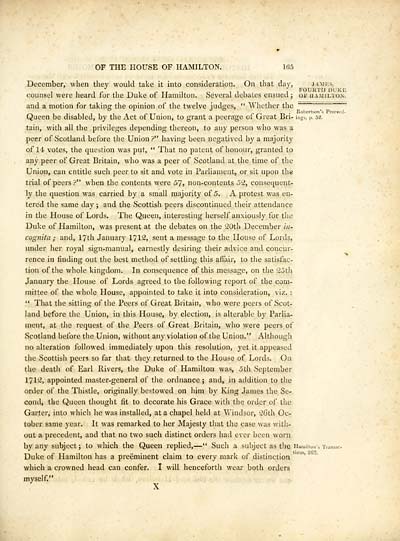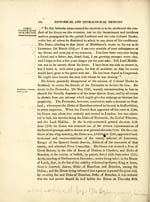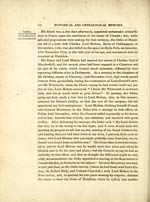Historical and genealogical memoirs of the House of Hamilton
(175) Page 165
Download files
Complete book:
Individual page:
Thumbnail gallery: Grid view | List view

OF THE HOUSE OF HAMILTON. 165
December, when they would take it into consideration. On that day, jamks.
i i. ' i n i i-* i i. in -i o ill i FOURTH DUKE
counsel were heard for the Duke or Hanulton. Several debates ensued ; of Hamilton.
and a motion for taking the opinion of the twelve judges, " Whether the
liiii ia^tt r i~\ Tt • Robertson's Proceet
Queen be disabled, by the Act of Union, to grant a peerage of Great Bit- in gs , p. 52.
tain, with all the privileges depending thereon, to any person who was a
peer of Scotland before the Union?" having been negatived by a majority
of 14 votes, the question was put, " That no patent of honour, granted to
any peer of Great Britain, who was a peer of Scotland at the time of the
Union, can entitle such peer to sit and vote in Parliament, or sit upon the
trial of peers ?" when the contents were 57, non-contents 52, consequent-
ly the question was carried by a small majority of 5. A protest was en-
tered the same day ; and the Scottish peers discontinued their attendance
in the House of Lords. The Queen, interesting herself anxiously for the
Duke of Hamilton, was present at the debates on the '20th December in-
cognita ; and, 17th January 1712, sent a message to the House of Lords,
under her royal sign-manual, earnestly desiring their advice and concur-
rence in finding out the best method of settling this affair, to the satisfac-
tion of the whole kingdom. In consequence of this message, on the 25th
January the House of Lords agreed to the following report of the com-
mittee of the whole House, appointed to take it into consideration, viz. :
" That the sitting of the Peers of Great Britain, who were peers of Scot-
land before the Union, in this House, by election, is alterable by Parlia-
ment, at the request of the Peers of Great Britain, who were peers of
Scotland before the Union, without any violation of the Union." Although
no alteration followed immediately upon this resolution, yet it appeased
the Scottish peers so far that they returned to the House of Lords. On
the death of Earl Rivers, the Duke of Hamilton was, 5th September
1712, appointed master-general of the ordnance ; and, in addition to the
order of the Thistle, originally bestowed on him by King James the Se-
cond, the Queen thought fit to decorate his Grace with the order of the
Garter, into which he was installed, at a chapel held at Windsor, 26th Oc-
tober same year. It was remarked to her Majesty that the case was with-
out a precedent, and that no two such distinct orders had ever been worn
by any subject ; to which the Queen replied, — " Such a subject as the. Hamilton's Transac-
Duke of Hamilton has a preeminent claim to every mark of distinction
which a crowned head can confer. I will henceforth wear both orders
myself."
X
December, when they would take it into consideration. On that day, jamks.
i i. ' i n i i-* i i. in -i o ill i FOURTH DUKE
counsel were heard for the Duke or Hanulton. Several debates ensued ; of Hamilton.
and a motion for taking the opinion of the twelve judges, " Whether the
liiii ia^tt r i~\ Tt • Robertson's Proceet
Queen be disabled, by the Act of Union, to grant a peerage of Great Bit- in gs , p. 52.
tain, with all the privileges depending thereon, to any person who was a
peer of Scotland before the Union?" having been negatived by a majority
of 14 votes, the question was put, " That no patent of honour, granted to
any peer of Great Britain, who was a peer of Scotland at the time of the
Union, can entitle such peer to sit and vote in Parliament, or sit upon the
trial of peers ?" when the contents were 57, non-contents 52, consequent-
ly the question was carried by a small majority of 5. A protest was en-
tered the same day ; and the Scottish peers discontinued their attendance
in the House of Lords. The Queen, interesting herself anxiously for the
Duke of Hamilton, was present at the debates on the '20th December in-
cognita ; and, 17th January 1712, sent a message to the House of Lords,
under her royal sign-manual, earnestly desiring their advice and concur-
rence in finding out the best method of settling this affair, to the satisfac-
tion of the whole kingdom. In consequence of this message, on the 25th
January the House of Lords agreed to the following report of the com-
mittee of the whole House, appointed to take it into consideration, viz. :
" That the sitting of the Peers of Great Britain, who were peers of Scot-
land before the Union, in this House, by election, is alterable by Parlia-
ment, at the request of the Peers of Great Britain, who were peers of
Scotland before the Union, without any violation of the Union." Although
no alteration followed immediately upon this resolution, yet it appeased
the Scottish peers so far that they returned to the House of Lords. On
the death of Earl Rivers, the Duke of Hamilton was, 5th September
1712, appointed master-general of the ordnance ; and, in addition to the
order of the Thistle, originally bestowed on him by King James the Se-
cond, the Queen thought fit to decorate his Grace with the order of the
Garter, into which he was installed, at a chapel held at Windsor, 26th Oc-
tober same year. It was remarked to her Majesty that the case was with-
out a precedent, and that no two such distinct orders had ever been worn
by any subject ; to which the Queen replied, — " Such a subject as the. Hamilton's Transac-
Duke of Hamilton has a preeminent claim to every mark of distinction
which a crowned head can confer. I will henceforth wear both orders
myself."
X
Set display mode to:
![]() Universal Viewer |
Universal Viewer | ![]() Mirador |
Large image | Transcription
Mirador |
Large image | Transcription
Images and transcriptions on this page, including medium image downloads, may be used under the Creative Commons Attribution 4.0 International Licence unless otherwise stated. ![]()
| Histories of Scottish families > Historical and genealogical memoirs of the House of Hamilton > (175) Page 165 |
|---|
| Permanent URL | https://digital.nls.uk/95391887 |
|---|
| Description | A selection of almost 400 printed items relating to the history of Scottish families, mostly dating from the 19th and early 20th centuries. Includes memoirs, genealogies and clan histories, with a few produced by emigrant families. The earliest family history goes back to AD 916. |
|---|

